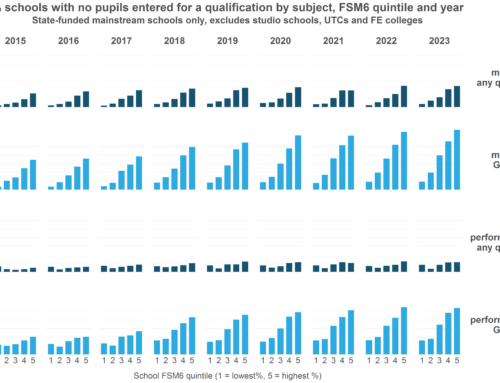Alongside the publication this morning of data covering EBacc entries and Attainment 8/Progress 8, a statistical first release (SFR) has been published on the destinations of the 2014/15 Key Stage 4 cohort.
This shows that 91 per cent were in a “sustained education destination” during the first two terms of 2015/16, and 94 per cent in a “sustained education, employment or training destination”, continuing upward trends since 2010/11. (The SFR notes that the 2014/15 increase in employment figures could be attributable in part to better data.)
The 2012/13 cohort was the first to be affected by the raising of the participation age. Young people are now supposed to remain in education and training until at least their 18th birthday. This includes full-time employment with part-time accredited education or training. Though as the chart above shows, the majority of young people previously continued into sustained education anyway.
So which young people are less likely to be participating?
Typically the groups of young people less likely to be participating in sustained education, employment or training are those who tend to have lower levels of attainment at Key Stage 4, including those with special educational needs (SEN), those eligible for free school meals (FSM) and those in alternative provision or pupil referral units (PRUs).
Five per cent of non-FSM (and non-SEN) young people are also not in sustained education, employment or training. One might suspect that these will also tend to be lower attaining at Key Stage 4, however, a breakdown by KS4 attainment is not currently published.
Pupils not in sustained education or training by pupil characteristic and KS4 establishment type
Besides those whose activity could not be established – one per cent of the cohort – those not recorded as having a sustained destination include:
- students who had some participation between August and July but did not sustain a destination from October to March;
- students who had no participation in education or employment but had claimed out-of-work benefits, or were recorded as not in education, employment or training (NEET) by their local authority between August and July.
Only around one per cent of young people were classified as not participating in education, employment or training at all. In other words, the majority of these young people participate, but not in a sustained way.
The challenge to improving sustained participation further probably lies in ensuring adequate pathways, support and guidance for young people with lower levels of attainment at Key Stage 4.
Want to stay up-to-date with the latest research from Education Datalab? Follow Education Datalab on Twitter to get all of Datalab’s research as it comes out.







Having been responsible at a school for collating this data I very much doubt the validity of much of the national picture. Has anyone picked one local authority area or a local cross section of schools and put proper resources into getting it right?
Much of the destination data for those at risk of NEET was difficult to verify – I thought we were moving towards aligning this effort with NI numbers for proper longitudinal tracking?